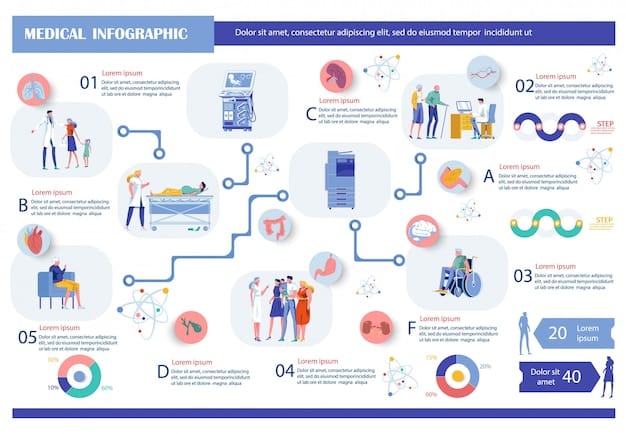Disability Benefits 2025: Application & Appeals Guide

Disability Benefits: Navigating the Application Process and Appealing Denials in 2025 requires a comprehensive understanding of eligibility criteria, application procedures, and appeal processes to secure essential government assistance in the United States.
Navigating the world of Disability Benefits: Navigating the Application Process and Appealing Denials in 2025 can feel overwhelming. This guide simplifies the process, providing essential information for a successful application and what to do if your claim is denied.
Understanding Disability Benefits in 2025
Disability benefits provide crucial financial support for individuals unable to work due to medical conditions. In 2025, understanding the nuances of these programs is more important than ever.
Types of Disability Benefits
There are primarily two types of disability benefits offered by the Social Security Administration (SSA): Social Security Disability Insurance (SSDI) and Supplemental Security Income (SSI).
- SSDI: Funded through payroll taxes, SSDI is for those who have worked and paid Social Security taxes.
- SSI: A needs-based program, SSI is for individuals with limited income and resources, regardless of work history.
- Key Differences: SSDI requires a work history; SSI is based on financial need.
Each program has specific eligibility requirements, making it essential to understand the differences.

The eligibility process for both SSDI and SSI involves meeting specific medical and non-medical criteria.
Medical Eligibility
To be medically eligible, your condition must prevent you from performing substantial gainful activity (SGA). The SSA maintains a “Listing of Impairments” (also known as the “Blue Book”), detailing specific medical conditions that automatically qualify for benefits.
- The Blue Book: Lists medical criteria for various conditions.
- SGA: The SSA defines SGA as earning more than a certain monthly amount.
- Duration: Your condition must be expected to last at least 12 months or result in death.
Even if your condition isn’t listed, you may still qualify if it’s medically equivalent to a listed impairment.
In summary, understanding the types of disability benefits and medical eligibility criteria is crucial for a successful application.
Navigating the Application Process
Applying for disability benefits can be a complex process. Knowing what to expect and how to prepare can significantly increase your chances of approval.
Gathering Necessary Documentation
Before starting your application, gather all relevant documentation, including medical records, work history, and financial information.
- Medical Records: Include doctor’s reports, test results, and hospital records.
- Work History: Provide details about your past jobs and why you can no longer perform them.
- Financial Information: Needed for SSI applications, including bank statements and asset information.
Accurate and complete documentation is essential for a thorough review of your claim.
The SSA offers multiple ways to apply for disability benefits, including online, by phone, and in person.
Application Methods
The SSA website is the most convenient option for many, but applying in person at a local Social Security office allows for personalized assistance.
- Online: Convenient and allows you to track your application status.
- Phone: Call the SSA’s toll-free number for assistance.
- In Person: Schedule an appointment at your local Social Security office.
Choose the method that best suits your needs and comfort level.
After submitting your application, the SSA will review it to determine if you meet the eligibility requirements.
The Review Process
The Disability Determination Services (DDS) within your state will evaluate your medical condition and determine if it prevents you from working.
- DDS Evaluation: Reviews your medical records and may request additional information.
- Consultative Examination (CE): The DDS may require you to undergo a CE by an SSA-approved doctor.
Be prepared to cooperate with the DDS and provide any requested information promptly.

Effectively navigating the application process involves careful preparation, thorough documentation, and cooperation with the SSA and DDS.
Understanding Denial Reasons
Many initial disability benefit applications are denied. Understanding common denial reasons can help you strengthen your case during an appeal.
Insufficient Medical Evidence
One of the most common reasons for denial is insufficient medical evidence. The SSA needs clear and comprehensive medical documentation to support your claim.
- Lack of Detail: Medical records may lack sufficient detail about the severity and impact of your condition.
- Inconsistent Information: Conflicting information in your medical records can raise doubts.
Ensure your medical records are thorough and consistent.
Another common reason for denial is the determination that your condition does not prevent you from performing any type of work.
Ability to Perform Substantial Gainful Activity (SGA)
If the SSA believes you can still perform SGA, your application will likely be denied.
- Transferable Skills: The SSA may argue that you have transferable skills from past jobs.
- Part-Time Work: Even the ability to perform part-time work can lead to denial.
Demonstrate how your condition limits your ability to perform any type of work.
Non-compliance with SSA requests can also lead to denial.
Non-Compliance
Failing to attend scheduled medical examinations or provide requested information can result in denial.
- Missed Appointments: Failing to attend a Consultative Examination (CE) without a valid reason.
- Lack of Cooperation: Not providing requested documentation or information promptly.
Always comply with SSA requests and keep them informed of any changes.
In short, understanding the reasons for denial is the first step in preparing a strong appeal.
Appealing a Disability Benefits Denial
If your disability benefits application is denied, you have the right to appeal. Understanding the appeals process is crucial.
The Appeals Process
The appeals process consists of four levels: Reconsideration, Hearing by an Administrative Law Judge (ALJ), Appeals Council Review, and Federal Court Review.
- Reconsideration: A complete review of your case by someone who didn’t handle the initial determination.
- Hearing by an ALJ: A hearing before an Administrative Law Judge who will review your case and hear testimony.
- Appeals Council Review: The Appeals Council reviews the ALJ’s decision for errors.
- Federal Court Review: If the Appeals Council denies your request, you can file a lawsuit in federal court.
Each level has specific deadlines and requirements.
The first step in the appeals process is requesting a reconsideration.
Requesting a Reconsideration
You must request a reconsideration within 60 days of receiving your denial notice. Include any new medical evidence that supports your claim.
- Deadline: 60 days from the date of your denial notice.
- New Evidence: Provide any new medical records or information.
If the reconsideration is also denied, you can request a hearing before an ALJ.
The ALJ hearing is a critical opportunity to present your case. Preparing for the hearing is paramount.
Preparing for an ALJ Hearing
Gather additional medical evidence, prepare testimony, and consider hiring an attorney to represent you.
- Medical Evidence: Obtain updated medical records and expert opinions.
- Testimony: Prepare to explain how your condition affects your ability to work.
- Legal Representation: An attorney can guide you through the process and advocate on your behalf.
Success in the appeals process often depends on thorough preparation and effective presentation of your case.
Common Mistakes to Avoid
Avoiding common mistakes can significantly improve your chances of successfully navigating the disability benefits process.
Incomplete or Inaccurate Information
Providing incomplete or inaccurate information on your application can lead to delays or denials.
- Thorough Review: Double-check all information before submitting your application.
- Honesty: Provide truthful and accurate information.
Complete and accurate information is crucial for a fair review of your claim.
Another common mistake is failing to follow up with the SSA.
Failure to Follow Up
Failing to follow up with the SSA can result in your application being overlooked or delayed.
- Check Status: Regularly check the status of your application online or by phone.
- Respond Promptly: Respond quickly to any requests for additional information.
Proactive communication with the SSA can help keep your application on track.
Finally, neglecting to seek legal assistance can be a significant mistake.
Not Seeking Legal Assistance
Navigating the disability benefits process without legal assistance can be challenging. An attorney can provide valuable guidance and representation.
- Expert Guidance: An attorney can help you understand the requirements and navigate the appeals process.
- Representation: An attorney can represent you at hearings and advocate on your behalf.
Seeking legal assistance can significantly increase your chances of success.
Strategies for Strengthening Your Claim
Implementing effective strategies can significantly strengthen your disability benefits claim and increase your likelihood of approval.
Comprehensive Medical Documentation
Ensuring you have comprehensive and detailed medical documentation is paramount.
- Regular Doctor Visits: Maintain consistent medical care and document all visits.
- Detailed Records: Ensure your medical records include detailed information about your condition, symptoms, and treatments.
Thorough medical documentation provides strong support for your claim.
Obtaining opinions from medical experts can also strengthen your case.
Expert Medical Opinions
Obtaining opinions from medical experts who specialize in your condition can provide valuable support.
- Specialist Reports: Include reports from specialists outlining the severity and impact of your condition.
- Functional Capacity Evaluations: Obtain evaluations that assess your ability to perform work-related activities.
Expert opinions can provide objective evidence to support your claim.
Finally, effectively communicating the impact of your condition is crucial.
Clearly Communicating Your Limitations
Clearly communicating how your condition limits your ability to work is essential.
- Detailed Descriptions: Provide detailed descriptions of your symptoms and how they affect your daily life.
- Work History: Explain how your condition has impacted your ability to perform past jobs.
Clearly articulating your limitations can help the SSA understand the full impact of your condition.
| Key Aspect | Brief Description |
|---|---|
| 📝 Application Process | Detailed guidance on gathering documentation and application methods. |
| ⚖️ Appealing Denials | Step-by-step process for appealing a denial, including hearings and legal help. |
| ❌ Avoiding Mistakes | Common errors to avoid in your application and how to prevent them. |
| 💪 Strengthening Claims | Tips and strategies to improve your claim’s chances of success. |
Frequently Asked Questions
▼
The primary types are Social Security Disability Insurance (SSDI) for those with a work history and Supplemental Security Income (SSI) based on financial need.
▼
SGA refers to the ability to earn more than a specific monthly amount, which the SSA defines. If you can perform SGA, you likely won’t qualify.
▼
The appeals process includes reconsideration, an ALJ hearing, Appeals Council review, and potentially a federal court review if initial attempts fail.
▼
Crucial documents include medical records, work history, and financial information. Thoroughness and accuracy speed up the review and strengthens your claim considerably.
▼
Steer clear of incomplete information, neglecting to follow up with the SSA, and being hesitant to seek legal assistance. Attorneys specialize in disability application assistance.
Conclusion
Successfully navigating Disability Benefits: Navigating the Application Process and Appealing Denials in 2025 involves understanding eligibility, meticulous preparation, and persistence. By familiarizing yourself with the process and avoiding common pitfalls, you can significantly improve your chances of securing the benefits you deserve. Remember to seek legal assistance when needed to navigate the complexities effectively.





